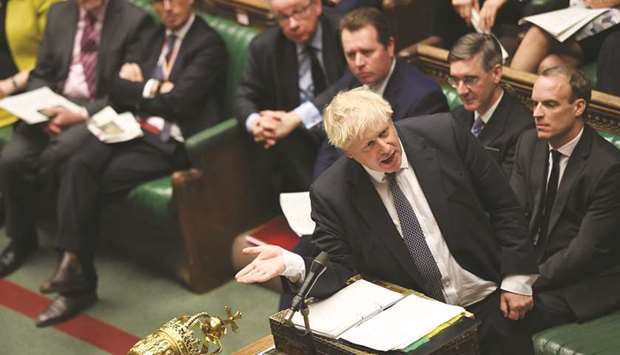European leaders were yesterday deciding whether to postpone Brexit and for how long, while Prime Minister Boris Johnson’s eyes turned towards a snap general election.
In tense parliamentary votes on Tuesday, Johnson won preliminary backing for the divorce deal he agreed with the EU, which would have seen Britain leave the bloc on October 31.
But, in a fresh twist to the divorce saga, MPs also rejected his bid to curtail parliamentary scrutiny of the bill and rush it through in a matter of days.
European Council president Donald Tusk has recommended that EU’s 27 other member states grant a flexible extension until January 31, 2020 — to be cut short if Britain ratifies the deal before then.
Johnson sent such a request for a three-month delay but only because he was obliged to do so under a law passed by rebel MPs and the prime minister continues to still insist Britain will leave at end of the month.
Brussels officials are concerned that if they grant too short an extension this could be seen as interfering in Britain’s domestic political timetable, by limiting the space for a pre-Brexit election.
But the decision on how long a prolongation will last will fall to EU member state leaders, many of whom would prefer a shorter delay to keep the pressure on Westminster to approve the deal quickly.
Ireland’s Prime Minister Leo Varadkar told Tusk in a call that he supports the January 31 date, but French officials are talking in terms of a much shorter timeline.
German Chancellor Angela Merkel’s spokesman said the request would “not fail due to Germany”, but another senior official suggested Berlin’s patience is finite.
“If it’s a question of pushing back the date by two or three weeks, to give MPs in London a chance to ratify, then it’s not really a problem,” German Foreign Minister Heiko Maas told RTL television.
“If it’s a question of pushing Brexit back until the end of January, we’d need to know why. What’s going to happen in the interval and will there be elections in Great Britain?”
France’s minister for European affairs, Amelie de Montchalin, said Paris was open to a Brexit delay “of a few days...to allow the British parliament to finish its procedure.”
Ambassadors from EU member states met later yesterday in Brussels to begin the decision-making procedure, but no response is expected before today.
“My impression is the meeting will serve to have a first picture where individual member states stand,” an EU diplomat said.
“The position of Tusk is known but some others want a short-term extension,” he said.
Tusk wants the EU leaders to approve the January 31 extension “by written procedure”, but — officials said — if the members’ positions are far apart, an emergency summit could be held on Monday next week.
As it stands, without their unanimous agreement, Britain is due to crash out of the EU in eight days’ time.
On Tuesday, Johnson told MPs that if parliament decided to “delay everything until January or possibly longer, in no circumstances can the government continue with this.”

Prime Minister Boris Johnson gesturing during the Prime Minister’s Questions (PMQs) session in the House of Commons in London yesterday.
